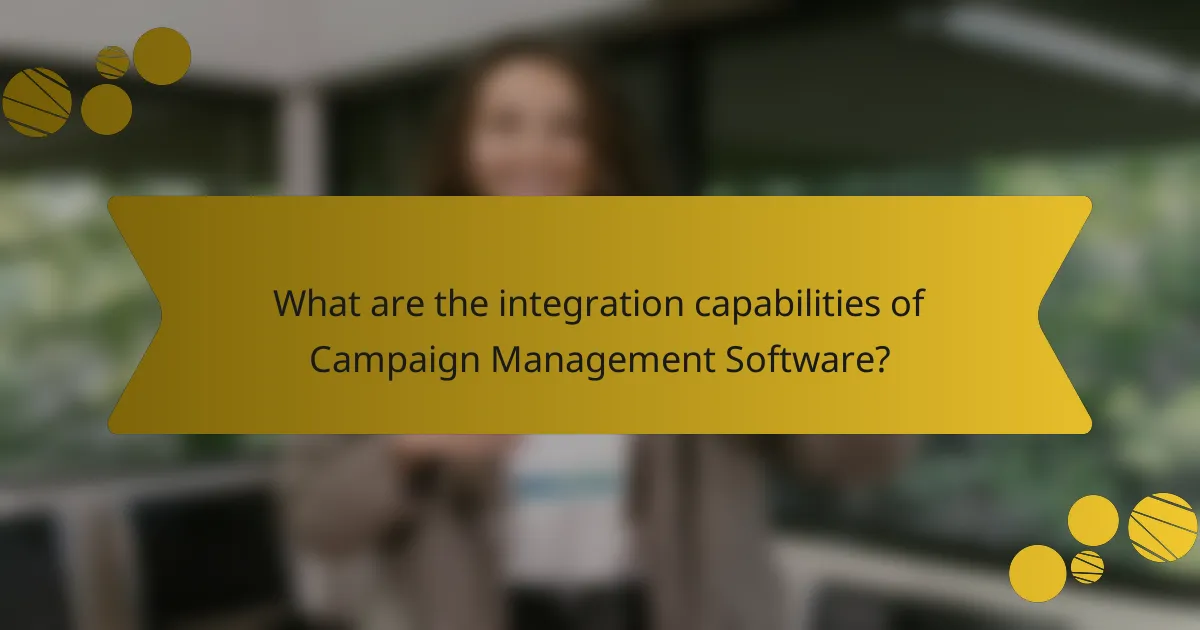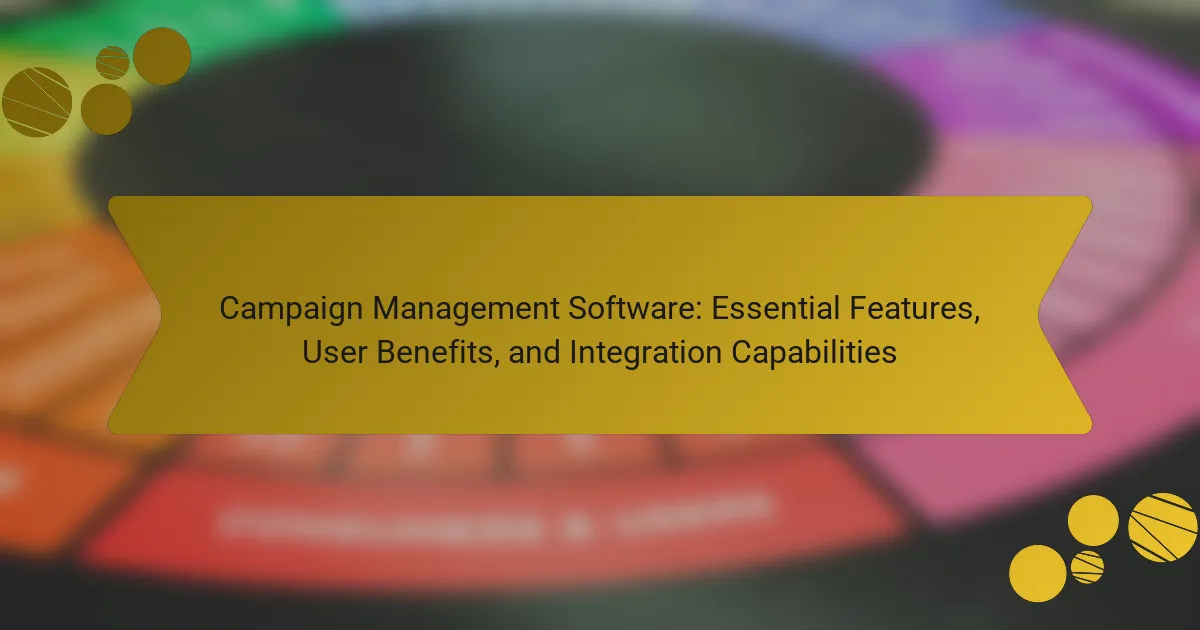Campaign management software is a digital tool designed to assist organizations in planning, executing, and analyzing marketing campaigns across various channels. Key features of this software include audience segmentation, automated communication, and performance analytics, which enable users to track real-time campaign performance and optimize strategies. Integration capabilities with platforms such as Customer Relationship Management (CRM) systems and email marketing tools enhance overall marketing efficiency. Reports indicate that a significant percentage of marketers experience improved campaign effectiveness and performance due to the use of campaign management software and its automation features.

What is Campaign Management Software?
Campaign management software is a digital tool that helps organizations plan, execute, and analyze marketing campaigns. This software streamlines the process of managing various marketing activities across multiple channels. It enables users to track campaign performance and optimize strategies based on real-time data. Features often include audience segmentation, automated communication, and performance analytics. According to a report by Gartner, 75% of marketers using such software see improved campaign effectiveness. This highlights the software’s role in enhancing marketing efficiency and ROI.
How does Campaign Management Software function?
Campaign Management Software functions by automating and streamlining marketing campaigns. It allows users to plan, execute, and analyze marketing efforts across various channels. The software provides tools for audience segmentation, enabling targeted messaging. Users can create and schedule campaigns using templates and predefined workflows. Real-time analytics track performance metrics, such as engagement and conversion rates. This data helps marketers optimize their strategies. Integration with other platforms enhances data sharing and campaign effectiveness. Overall, it simplifies campaign management and improves marketing outcomes.
What are the key components of Campaign Management Software?
Key components of Campaign Management Software include automation tools, analytics and reporting features, customer segmentation, and multi-channel integration. Automation tools streamline the execution of marketing campaigns. Analytics and reporting features provide insights into campaign performance and ROI. Customer segmentation allows marketers to target specific audiences effectively. Multi-channel integration ensures consistent messaging across various platforms. These components collectively enhance campaign efficiency and effectiveness.
How do these components interact to optimize campaigns?
Campaign management software optimizes campaigns by integrating essential features such as automation, analytics, and user segmentation. Automation streamlines repetitive tasks, allowing marketers to focus on strategy. Analytics provide insights into campaign performance, enabling data-driven decisions. User segmentation allows for targeted messaging, increasing engagement rates. These components work together to enhance efficiency and effectiveness. For instance, a study by HubSpot found that companies using marketing automation see a 14.5% increase in sales productivity. This demonstrates the tangible benefits of integrating these components in campaign management.
What essential features should Campaign Management Software have?
Campaign Management Software should have features such as campaign planning, execution, and analytics. These tools enable users to design and launch marketing campaigns effectively. Additionally, automation capabilities streamline repetitive tasks, improving efficiency. User segmentation allows for targeted messaging based on audience characteristics. Integration with CRM systems ensures seamless data flow and customer relationship management. Real-time reporting provides insights into campaign performance. Multi-channel support enables campaigns across various platforms like email, social media, and web. Lastly, user-friendly interfaces enhance accessibility for marketers of all skill levels. These features collectively enhance the overall campaign management process.
How do automation tools enhance campaign efficiency?
Automation tools enhance campaign efficiency by streamlining processes and reducing manual tasks. They enable marketers to schedule and execute campaigns automatically. This automation saves time and minimizes human errors. According to a report by HubSpot, businesses that use marketing automation see a 14.5% increase in sales productivity. Automation tools also provide data analytics, allowing for real-time performance tracking. This data helps marketers make informed decisions quickly. Additionally, these tools can segment audiences effectively, leading to more targeted messaging. Ultimately, automation tools increase overall campaign effectiveness and return on investment.
What role does analytics play in Campaign Management Software?
Analytics plays a crucial role in Campaign Management Software by enabling data-driven decision-making. It helps marketers track campaign performance in real-time. Analytics provides insights into user engagement and conversion rates. This information allows for optimization of marketing strategies. Additionally, it identifies the most effective channels and messaging. According to a study by HubSpot, companies using analytics in campaigns see a 5-10% increase in ROI. By leveraging analytics, businesses can allocate resources more efficiently. Ultimately, it enhances the overall effectiveness of marketing efforts.
How important is user-friendly design in Campaign Management Software?
User-friendly design is crucial in Campaign Management Software. It enhances usability and improves user experience. Software that is easy to navigate allows marketers to create, manage, and analyze campaigns efficiently. A study by Nielsen Norman Group indicates that users are more likely to engage with software that has a clear, intuitive interface. This leads to increased productivity and reduced training time. Furthermore, user-friendly design can significantly lower the chances of errors during campaign execution. Overall, a well-designed interface supports better decision-making and campaign outcomes.

What are the user benefits of Campaign Management Software?
Campaign Management Software provides several user benefits. It streamlines the planning and execution of marketing campaigns. Users can automate tasks, which saves time and reduces manual errors. This software offers analytics tools that help track campaign performance in real-time. Users can segment their audience effectively for targeted marketing. It enhances collaboration among team members through shared dashboards and communication tools. The integration capabilities with other platforms improve overall marketing efficiency. According to a study by HubSpot, 70% of marketers reported improved campaign performance due to automation features.
How does Campaign Management Software improve campaign performance?
Campaign Management Software improves campaign performance by streamlining processes and enhancing data analysis. It automates repetitive tasks, allowing marketers to focus on strategy and creativity. The software provides real-time analytics, enabling quick adjustments to campaigns based on performance metrics. It also facilitates better targeting through segmentation and personalization. According to a study by HubSpot, companies using campaign management tools see a 20% increase in lead conversion rates. This increase is attributed to improved audience engagement and optimized resource allocation. Overall, Campaign Management Software enhances efficiency and effectiveness in marketing campaigns.
What metrics indicate the success of campaigns managed through software?
Key metrics indicating the success of campaigns managed through software include conversion rates, click-through rates, and return on investment. Conversion rates measure the percentage of users taking a desired action, such as making a purchase. Click-through rates indicate the proportion of users who clicked on a campaign link compared to those who viewed it. Return on investment quantifies the revenue generated relative to the campaign’s cost. Additional metrics may include engagement rates, lead generation numbers, and customer retention rates. These metrics provide actionable insights into campaign performance and effectiveness.
How does Campaign Management Software save time and resources?
Campaign Management Software saves time and resources by automating repetitive tasks. It streamlines the planning, execution, and analysis of marketing campaigns. Automation reduces the need for manual input, which minimizes errors and speeds up processes.
Additionally, these tools provide centralized data management. This allows marketers to access real-time analytics and insights quickly. According to a study by HubSpot, businesses using automation software can save up to 10 hours per week. This time can be redirected towards strategic planning and creative development.
Furthermore, Campaign Management Software enhances collaboration among team members. Integrated communication features ensure everyone is on the same page. This reduces delays and miscommunication, leading to more efficient workflows. Overall, these capabilities contribute to significant time and resource savings.
Who can benefit from using Campaign Management Software?
Marketing teams can benefit from using Campaign Management Software. This software helps streamline campaign planning and execution. Businesses seeking to enhance their marketing strategies also gain advantages. Non-profit organizations can effectively manage outreach campaigns through this software. Agencies managing multiple client campaigns find it invaluable for organization. E-commerce businesses utilize it to track customer engagement and sales. Additionally, data analysts benefit from the insights generated by the software. Overall, any organization focused on improving marketing efficiency can leverage Campaign Management Software.
What types of organizations are best suited for Campaign Management Software?
Organizations that are best suited for Campaign Management Software include marketing agencies, non-profits, and large enterprises. Marketing agencies benefit from streamlined campaign execution and analytics. Non-profits can enhance donor engagement and fundraising efforts. Large enterprises require coordinated marketing across various departments. These organizations often manage multiple campaigns simultaneously. They also need to track performance across diverse channels. Campaign Management Software provides tools for automation and reporting. This ensures efficiency and effectiveness in their marketing strategies.
How does Campaign Management Software cater to different marketing strategies?
Campaign Management Software supports various marketing strategies through customizable features and tools. It allows users to segment audiences based on demographics, behaviors, and preferences. This segmentation facilitates targeted messaging that resonates with specific groups. The software also integrates with analytics tools to track campaign performance in real-time. Users can adjust strategies based on data insights, enhancing effectiveness. Additionally, it supports multi-channel marketing, enabling campaigns across email, social media, and more. This versatility helps brands maintain consistent messaging across platforms. Overall, Campaign Management Software adapts to diverse marketing needs, improving engagement and ROI.

What are the integration capabilities of Campaign Management Software?
Campaign Management Software typically integrates with various platforms and tools to enhance marketing efforts. Common integration capabilities include connecting with Customer Relationship Management (CRM) systems, email marketing platforms, and social media networks. These integrations allow for seamless data transfer and improved campaign tracking.
For instance, integration with CRM systems enables user segmentation based on customer data. This leads to more targeted marketing strategies. Additionally, connecting with email platforms allows for automated email campaigns based on user interactions. Social media integrations facilitate direct posting and engagement tracking across multiple channels.
According to a report by Gartner, 70% of marketers find integrated software solutions enhance their campaign effectiveness. This statistic underscores the importance of integration capabilities in optimizing marketing strategies.
How does Campaign Management Software integrate with other tools?
Campaign Management Software integrates with other tools through APIs and third-party connectors. These integrations allow seamless data sharing between platforms. For instance, it can connect with CRM systems to sync customer data. Additionally, integration with email marketing tools enables automated campaign delivery. Social media platforms can also be linked for real-time engagement tracking. Many Campaign Management Software solutions support integration with analytics tools for performance measurement. This connectivity enhances campaign effectiveness and streamlines workflows. Research shows that 70% of marketers benefit from integrated tools for data-driven decision-making.
What are the benefits of integrating CRM systems with Campaign Management Software?
Integrating CRM systems with Campaign Management Software enhances customer insights and streamlines marketing efforts. This integration allows for better segmentation of target audiences. It enables personalized marketing campaigns based on customer behavior and preferences. Additionally, it improves tracking of campaign performance through unified data. This leads to more accurate reporting and analysis. Enhanced collaboration between sales and marketing teams is another key benefit. According to a study by HubSpot, companies that integrate these systems experience a 20% increase in sales productivity. Overall, this integration drives more effective marketing strategies and improves ROI.
How do social media platforms enhance the functionality of Campaign Management Software?
Social media platforms enhance the functionality of Campaign Management Software by enabling real-time audience engagement and data-driven insights. They allow marketers to track user interactions and engagement metrics across various channels. This integration facilitates targeted advertising based on user behavior and preferences. Social media platforms also support automated posting and scheduling features within campaign management tools. According to a report by HubSpot, 73% of marketers believe that their efforts through social media marketing were “somewhat effective” or “very effective” for their business. This effectiveness underscores the importance of integrating social media with campaign management software. By utilizing social media analytics, marketers can refine their strategies for better ROI.
What challenges might users face when integrating Campaign Management Software?
Users may face several challenges when integrating Campaign Management Software. Data compatibility issues often arise due to varying formats and systems. Users may struggle with migrating existing data into the new software. Additionally, training staff to effectively use the new system can be time-consuming. Resistance to change from team members may hinder successful adoption. Users may also encounter integration difficulties with other marketing tools and platforms. Limited technical support can exacerbate these issues during the integration process. Lastly, budget constraints may restrict the ability to implement necessary features or upgrades.
How can users troubleshoot common integration issues?
Users can troubleshoot common integration issues by following systematic steps. First, they should verify the integration settings in the campaign management software. Incorrect configurations often lead to integration failures. Next, users should check for any software updates available for both the campaign management tool and the integrated platforms. Outdated software can cause compatibility issues.
Additionally, users should review the API documentation for both systems. This documentation provides essential guidelines for proper integration. If errors persist, users should examine error logs for specific messages that indicate the nature of the problem. Error logs can pinpoint the exact issue, facilitating faster resolution.
Finally, reaching out to customer support can provide expert assistance. Many software providers offer dedicated support for integration issues. Following these steps increases the likelihood of resolving common integration problems effectively.
What best practices should be followed for successful integration?
Successful integration requires clear communication among stakeholders. Establishing a shared vision helps align goals and expectations. Conducting a thorough assessment of existing systems ensures compatibility. Developing a detailed integration plan outlines steps and timelines. Testing the integration in a controlled environment identifies potential issues early. Providing training for users enhances adoption and effectiveness. Monitoring the integration post-launch allows for adjustments as needed. Documenting the process facilitates future integrations and knowledge sharing.
What tips can enhance the use of Campaign Management Software?
Utilizing Campaign Management Software effectively requires strategic planning and organization. First, define clear campaign goals to guide your efforts. Next, segment your audience for targeted messaging. This increases engagement rates. Additionally, automate repetitive tasks to save time and reduce errors. Regularly analyze performance metrics to refine strategies. Use A/B testing to optimize messaging and design. Integrate with other tools for streamlined workflows. Lastly, ensure team collaboration through shared access and communication features. These practices enhance the software’s effectiveness and improve overall campaign outcomes.
Campaign Management Software is a digital tool designed to help organizations plan, execute, and analyze marketing campaigns effectively. This article covers the essential features of such software, including automation, analytics, and user segmentation, which collectively enhance campaign efficiency and performance. It also discusses the user benefits, such as improved marketing outcomes and time savings, as well as the integration capabilities with other platforms like CRM and social media. Additionally, the article highlights key metrics for measuring campaign success and offers best practices for optimizing the use of Campaign Management Software.
